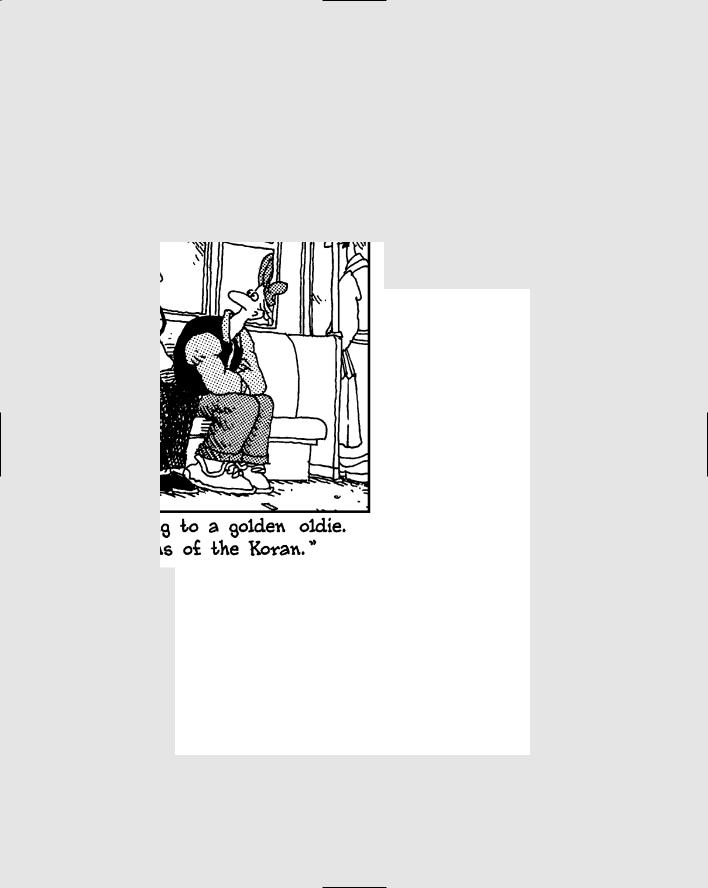
Arabic_for_Dummies
.pdf
306 Part IV: The Part of Tens ____________________________________________
This term of welcoming is extremely popular with Arabic speakers. It’s usually said with a lot of zest and enthusiasm and is often accompanied by very animated hand gestures. It’s not uncommon for someone to say marHaba bikum and then proceed to hug you or give you a kiss on the cheek! This expression is a very affectionate form of greeting someone, such as an old friend, a very special guest, or a close family relative. But the relationship doesn’t necessarily have to be a close one — if you’re ever invited into a Middle Eastern home for a dinner or a lunch, don’t be surprised if the host jovially shouts marHaba bikum and gives you a great big bear hug!
The shortened form of marHaba bikum is to simply say marHaba, which literally means “welcome.” You may also say marHaba bika (mahr-hah-bah bee-kah), which is the masculine singular form of marHaba bikum. (So you use marHaba bika when greeting a male friend and marHaba biki (mahr- hah-bah bee-kee) to greet a female friend because biki is the feminine singular form of bikum.) Finally, if you have a very close relationship with the person you’re greeting, you may even use a variation of the following expression: marHaba ya habibi (mahr-hah-bah yah hah-bee-bee; Welcome my darling [M]) or marHaba ya Habibtii (mahr-hah-bah yah hah-bee-beh-tee;
Welcome my darling [F]).
mumtaaz!
moom-tahz; Excellent!
This expression is used much like “excellent” is used in English: It’s a way to note that something is going very well. For instance, a teacher may tell her students mumtaaz if they conjugate a difficult Arabic verb in the past tense, or a fan may yell mumtaaz if his hometown team scores a goal against an opponent. mumtaaz is used during joyous events or as a sign of encouragement. It’s a very positive word that Arabic speakers like to use because it connotes a positive attitude. If you’re having a conversation with a native speaker, it’s very likely that he or she will use the word mumtaaz a lot for the duration of the conversation. You should do the same!
al-Hamdu li-llah
al-hahm-doo lee-lah; Praise to God
A number of expressions in the Arabic language make reference to allah for a very simple reason: As a spoken language, Arabic evolved from the writings

______________________________ Chapter 19: Ten Favorite Arabic Expressions 307
of the Koran — Islam’s Holy Book — which was recorded soon after the death of the Prophet Muhammad. Muslims believe that the Koran is actually God’s words transmitted by the Angel Gabriel to the Prophet Muhammad.
According to Muslim tradition and belief, the Koran is literally God’s message to His followers. Therefore, a lot of references to allah come directly from the Koran. Although spoken Arabic evolved from a religious language based on the Koran toward one with a more secular and everyday usage, it nevertheless retained many of its references to allah. Although they’re based on a direct reference to allah, many of these phrases are actually used quite casually nowadays.
al-Hamdu li-llah, which has very wide usage, is a part of everyday Arabic. Arabic speakers say al-Hamdu li-llah after performing almost any single task, including finishing a meal, drinking water, finishing a project at work, and running an errand. The expression’s extensive application goes beyond completing tasks; for example, if someone asks you, kayf al-Haal? (kah-yef al-hal; How are you doing?) you may reply, al-Hamdu li-llah and mean “Praise to God; I’m doing well.” Because of its versatility, it’s customary to hear al-Hamdu
li-llah quite often when native speakers are talking to each other.
inshaa’ allah
een-shah-ah ah-lah; If God wishes it
If you’ve ever watched Arabic speakers on Arabic TV, you’ve probably heard them use the expression inshaa’ allah. This expression, which literally means “If God wishes it” or “If God wills it,” is very popular among Arabic speakers when discussing future events. It’s almost a rule that whenever someone brings up an event that will take place in the future, the expression inshaa’ allah follows soon after. For example, when someone asks you how you think you’re going to do on your next exam, you say, ‘atamannaa ‘an ‘anjaH inshaa’ allah (ah-tah-mah-nah ann an-jaheen-shah-ah ah-lah; I hope I do well, if God wishes it). Or if someone asks you if your sister is going to start working soon, you say, sa-tabda’u al-‘ithnayn inshaa’ allah (sa-tab-dah-oo al-eeth-nah- yen een-shah-ah ah-lah; she starts on Monday, if God wishes it). Politicians in particular like to use this expression when someone asks them when they’re going to hold elections. They say, waqt qariib inshaa’ allah (wah-ket kah-reeb een-shah-ah ah-lah; Sometime soon, if God wishes it).

308 Part IV: The Part of Tens ____________________________________________
mabruk!
mahb-rook; Blessing upon you!
The root of the word mabruk is the noun baraka (bah-rah-kah), which means “blessing.” mabruk is used at joyous occasions, such as the birth of a baby, a wedding, a graduation ceremony, or another festive event. Though its strict interpretation is “Blessing upon you,” mabruk is just like saying “Congratulations.” When you say mabruk, make sure you say it with a lot of energy and enthusiasm!
bi ‘idni allah
bee eed-nee ah-lah; With God’s guidance
This expression is meant to motivate and offer support and guidance, and although this expression contains a reference to God, it’s actually a lot less common than expressions such as inshaa’ allah or al-Hamdu li-llah. bii ‘idni allah is used only during very special occasions, when one is facing serious challenges or is having difficulty in life, marriage, work, or school. Whenever someone’s facing hardship, it’s common for him or her to say sa-‘uwaajihu haadhihi as-su’uubu bi ‘idni allah (sah-oo-wah-jee-hoo hah-zee-hee ah-so-oo- bah bee eed-nee ah-lah; I will face this difficulty, with God’s guidance). You can also use bii ‘idni allah to encourage a friend who’s having troubles. You may tell her, kul shay’ sa-yakun ki-khayr bi‘idniallah (kool shah-yeh sah-yah- koon kee-kah-yer bee eed-nee ah-lah; All will go well, with God’s guidance).
bi SaHHa
bee sah-hah; With strength
Even though this expression literally means “with strength,” it’s not necessarily used in a context of encouragement or support like bi ‘idni allah is (see the preceding section). Rather, bi SaHHa is an appropriate thing to say after someone has finished a difficult task and can relax and enjoy himself. For example, if a friend has wrapped up writing a book, closed a big deal, or ended a difficult case, you may say to him bi SaHHa, which signifies that your friend will be stronger as a result of accomplishing what he’s accomplished and now can rest a bit.

______________________________ Chapter 19: Ten Favorite Arabic Expressions 309
taHiyyaat
tah-hee-yat; Regards
taHiyyaat is a religious term that Muslims use when they’re praying. After a Muslim finishes praying, he performs the taHiyyaat by turning once to the right and once to the left, acknowledging the two angels that Muslims believe guard each person.
In addition to its religious affiliation, Arabic speakers commonly use taHiyyaat to send their regards. For instance, a friend may say to you, salaam ‘an ‘abuuka (sah-lam ann ah-boo-kah; Say hello to your father for me.) Similarly, to send your regards to a friend, you say, taHiyyaat.
muballagh
moo-bah-lag; Equally
muballagh is an expression that’s similar to taHiyyaat in that you use it to send regards. However, unlike taHiyyaat, muballagh is a response; that is, you use it after someone sends their regards to you. So if someone says to you, salaam ‘an ‘ukhtuk (sah-lam ann ook-took; Say hello to your sister for me), you respond, muballagh. Responding with this expression means that you acknowledge the message and thank the person for it on behalf of your sister. So make sure to only say muballagh after someone sends their regards — not before!
tabaaraka allah
tah-bah-rah-kah ah-lah; With God’s blessing
This expression is the equivalent of “God bless you” in English; it’s most commonly used among close friends or family members to congratulate each other on accomplishments, achievements, or other happy events. For instance, if a son or daughter receives a good grade on an exam, the parents would say, tabaaraka allah. Another very popular use for this expression is to express warmth and joy toward kids.

310 Part IV: The Part of Tens ____________________________________________

Chapter 20
Ten Great Arabic Proverbs
In This Chapter
Illuminating the meaning of modesty
Seeking knowledge
Expressing the importance of teamwork
Even if you’ve read only a few chapters of this book, you’ve probably figured out that Arabic is a very poetic language. One aspect of the lan-
guage that reinforces its poetic nature is the use of ‘amthila (am-thee-lah; proverbs). Proverbs play an important role in the Arabic language. If you’re having a conversation with an Arabic speaker or listening to Arabic speakers converse among themselves, don’t be surprised to hear proverbs peppered throughout the conversation. This chapter introduces you to some of the more common and flowery proverbs of the Arabic language.
al-’amthaal noor al-kalaam.
al-am-thal noor al-kah-lam; Proverbs are the light of speech.
The role of proverbs in Arabic is so important that there’s a proverb on the importance of proverbs!
‘a’mal khayr wa ‘ilqahu fii al-baHr.
ah-mal kah-yer wah eel-kah-hoo fee al-bah-her; Do good and cast it into the sea.
Arab culture emphasizes humility and modesty. This proverb means that when you commit a charitable act, you shouldn’t go around boasting about it; rather, you should “cast it into the sea” where no one can find out about it.

312 Part IV: The Part of Tens ____________________________________________
‘uTlubuu al-’ilm min al-mahd ‘ilaa al-laHd.
oot-loo-boo al-ee-lem meen al-mahd ee-lah al-lah-hed; Seek knowledge from the cradle to the grave.
al-’ilm (al-ee-lem; knowledge) is an important virtue in Arabic culture. Arabs have produced some of the greatest legal, medical, and scientific minds in history, in no small part because Arabs like to instill in their children a lifelong desire to learn and continue learning every single day of one’s existence.
yad waaHida maa tusaffiq.
yad wah-hee-dah mah too-sah-feek; A hand by itself cannot clap.
This proverb, which is common in the West but originates in Arab culture, underscores the importance of teamwork, cooperation, and collaboration.
al-Harbaa’ laa Yughaadir shajaratuh hattaa yakun mu’akkid ‘an shajara ‘ukhraa.
al-har-bah lah yoo-gah-deer shah-jah-rah-tooh hah-tah yah-koon moo-ah-keed ann shah-jah-rah ook-rah; The chameleon does not leave his tree until he is sure of another.
This proverb stresses the importance of foresight, planning, and looking ahead. A chameleon that is mindful of predators won’t change trees until it knows that it’ll be safe in the next tree it goes to.
khaTa’ ma’roof ‘aHsan min Haqiiqa ghayr ma’roofa.
kah-tah mah-roof ah-san meen hah-kee-kah gah-yer mah-roo-fah; A known mistake is better than an unknown truth.

__________________________________ Chapter 20: Ten Great Arabic Proverbs 313
This metaphysical proverb has a deep meaning: It’s better for you to identify and learn from a mistake than to not know a truth at all. In the debate of known versus unknown knowledge, this proverb indicates that knowing is better than not knowing, even if what you know is not an absolute truth.
as-sirr mithel al-Hamaama: ‘indamaa yughaadir yadii yaTiir.
ah-seer mee-thel al-hah-mah-mah: een-dah-mah yoo-gah-deer yah-dee yah-teer; A secret is like a dove: When it leaves my hand, it flies away.
A secret is meant to be kept close to your chest — in other words, you shouldn’t divulge a secret. As soon as you let a secret out of your “hand,” it flies away and spreads around. Just as a dove won’t leave unless you release it, a secret won’t become known unless you divulge it.
al-’aql li an-niDHaar wa al-kalb li as-simaa’.
al-ah-kel lee ah-nee-zar wah al-kah-leb lee ah-see-mah; The mind is for seeing, and the heart is for hearing.
The mind is to be used for analytical purposes: observation and analysis. The heart, on the other hand, is for emotions; you should listen and feel with your heart.
kul yawm min Hayaatuk SafHa min taariikhuk.
kool yah-oum meen hah-yah-took saf-hah meen tah-ree-kook; Every day of your life is a page of your history.
You only live one life, so you should enjoy every single day. At the end, each day’s experiences are what make up your history.

314 Part IV: The Part of Tens ____________________________________________
li faatik bi liila faatik bi Hiila.
lee fah-tek bee lee-lah fah-tek bee hee-lah; He who surpasses (is older than) you by one night surpasses you by one idea.
In Arabic culture and society, maturity and respect for elders is a highly regarded virtue. This proverb reinforces the idea that elders are respected, and their counsel is sought often.

Part V
Appendixes
